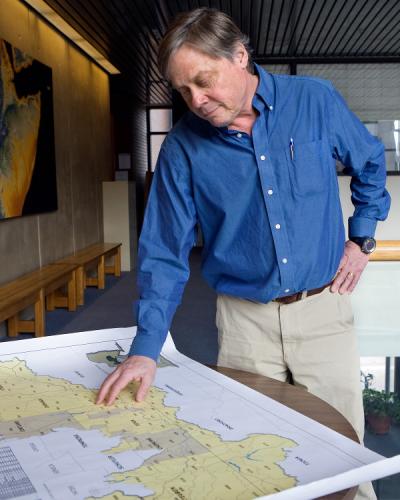Robert Howarth, a Cornell professor who sits on New York’s Climate Action Council, advised state senators to downsize the state’s natural gas pipeline system, repeal laws that allow for easy gas connection to new homes and to prohibit utilities from offering inducements to purchase gas appliances.
Howarth, the David R. Atkinson Professor of Ecology and Environmental Biology in the College of Agriculture and Life Sciences, testified Jan. 19 before the New York State Senate standing committees on Finance, Energy and Telecommunications, and Environmental Conservation, at the hearing on the Implementation of the Climate Action Council Final Scoping Plan.
The draft scoping plan is the blueprint to implement the groundbreaking New York State Climate Leadership and Community Protection Act (CLCPA) – the state’s key environmental law for mitigating climate change – which was signed by then-Gov. Andrew Cuomo on July 18, 2019 and went into effect Jan. 1, 2020.
The scoping plan shows that we can meet the goals of the CLCPA, the climate law, and that we can do so in a way that is affordable and will benefit all New Yorkers,” Howarth said. “Our state will be stronger as the plan is implemented. The health and well-being of our citizens improved. I think the health aspects are important. Economic uncertainties and vulnerabilities will be reduced. Energy security will be enhanced.”
The environmental law tackles a warming climate in many ways, including a mandatory reduction in greenhouse gas emissions to 40% below 1990 levels by 2030 throughout the state and then 85% below 1990 levels by 2050. The plan is to attain net zero emissions in all the state by mid-century.
New York plans for a one-third reduction in the use of natural gas, which results in methane being released into the atmosphere, and a 60% reduction by 2035. “That means in the interest of safety and the economic viability of the average person in the state,” Howarth said, “we need to have an organized downsizing of the gas pipeline system and we need to start planning for that urgently.”
Current state law still allows utilities to easily connect new homes and buildings to the natural gas infrastructure if they are within 100 feet of a gas main. “That’s clearly antithetical to the intent of the CLCPA,” he said. “And I believe that should be changed legislatively.”
Natural gas utilities still provide rebates and incentives to promote the use of natural gas in homes for new furnaces, water heaters and clothes dryers, he said, “Again, this is antithetical to the CLCPA and I believe should be acted on administratively.”
As part of the first panel for the day, Howarth joined fellow Climate Action Council members Mario Cilento, president of the New York State AFL-CIO and Raya Salter, executive director of the Energy Justice Law and Policy Center at the senate hearing.
Early in their two-hour testimony, Howarth requested that the New York legislatures restore a requirement for all-electrification for new homes. “We’ve backed off somewhat,” he said, “and I would like to see the Senate and Assembly restore the dates, which we [scientists] had urged in our original draft plan from years ago.”
Among the many questions from senators, Sen. Pete Harckham (D-Westchester) asked about the affordability of the plan for consumers.
Howarth said studies show that if new homes are built with electric heat pumps, homeowners may save money within three years. “So that’s part of the reason I don’t believe we should postpone moving to electrification,” he said. “The climate goals demand it, but it’s also in the interest of homeowners.”
Sen. Dan Stec (R-Queensbury) asked about the costs for the decades-long project of upgrading the state’s electric grid.
The economic analysis for the scoping plan was developed by the staff at NYSERDA and consultants to the Climate Action Council.
Implementing the environmental plan will cost New York about $270 billion over the next 30 years, Howarth said, which is about the half the estimated cost predicted 10 years ago. Costs are coming down: “If you look at the costs associated with what we’re doing now with fossil fuels, the $270 billion to implement this plan is less than the damage that’s being done currently – and and by a substantial amount,” he said, noting that with plan implementation, New York could see between $130 billion and $210 billion in net savings.
Howarth pointed out that the scoping plan notes that buildings make up 32% of greenhouse gas emissions in New York and he argued in his formal senate statement that statistic may be closer to 40%. Transportation is the second-leading emitting sector at 28%.
Said Howarth: “Climate change is real, it’s immediate, it’s urgent and we in New York to do all that we can to move to address it.”





